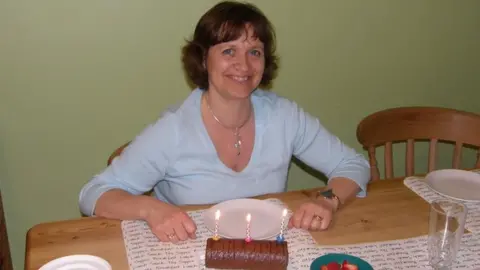Ian Stewart: Helen Bailey's killer on trial over Diane Stewart's murder
 Contributed
ContributedA man convicted of killing a children's author has gone on trial charged with murdering his wife six years earlier.
Ian Stewart, 61, was found guilty of murdering Helen Bailey in Hertfordshire in 2016.
He has denied killing Diane Stewart, 47, who died at the family home in Bassingbourn, Cambs, on 25 June 2010.
Huntingdon Crown Court heard tests on Mrs Stewart's brain tissue, donated for medical research, showed that her "breathing had been restricted".
Police re-investigated the death of Diane Stewart after a jury found him guilty in 2017 of the murder of Ms Bailey.
During the opening of the current trial, the court heard although most of Mrs Stewart's remains were cremated, "she had donated her brain to medical research and brain tissue was kept".
Prosecutor Stuart Trimmer QC said Stewart was initially "able to fool medical professionals by suggesting his wife, Diane Stewart, had died in the course of an epileptic fit".
'Sports car'
However, he said scientists and pathologists were instructed to re-examine the circumstances, and analysis of the brain tissue indicated her death was "most likely caused by a prolonged restriction to her breathing from an outside source".
One consultant neurologist gave her risk of Sudden Unexpected Death in Epilepsy (Sudep) at the time as "extremely low - one in 100,000", Mr Trimmer said.
The prosecutor said the "narrative involving an epileptic fit that day appears to have originated from Ian Stewart, rather than from any other source".
Mr Trimmer said that, following Mrs Stewart's death, Stewart's behaviour was "hard to square with the conduct of a grieving husband".
"He was shortly out buying a sports car and embarked upon a new relationship," the barrister said.
"The conclusions, in short, are these - the cause of death was most likely caused by a prolonged restriction of her breathing from an outside source, and that the account given by Ian Stewart, the only other person on the premises, is directly contradicted by the medical evidence," said Mr Trimmer.
The trial, expected to last up to four weeks, continues.

Find BBC News: East of England on Facebook, Instagram and Twitter. If you have a story suggestion email [email protected]
